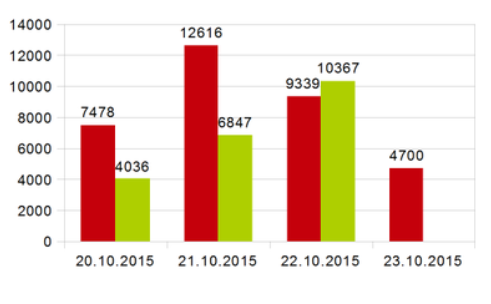12 km from Brezice, Slovenia (Camp Dobova)
Report from last night:
Around 2.000 people are staying out in a farm field, with neither food nor water given to them. This area is only 100 meters away from the Croatian border. Some are warming their hands on little camp fires, only a few have blankets. Police are in riot gear, some carry machine guns. A helicopter is wheeling over the area, turning flashlights on the people. People are crying for water. From quite a distance, you hear them chanting: „Let us go!“
Police are kettling up the crowd, no one is allowed to enter except for three doctors from the Red Cross.
The helpers want to bring food and clothes but are only briefly allowed to do so – Police say it would cause riots. After two hours, we receive permission to distribute baby clothing, oranges and water. People are staying out, sleeping in the grass. The outside temperature is 1°C.
Fortunately, we manage to connect to Croatian activists and catch a large group of people, around 1.500, shortly before they enter the camp at Dobova. This makes it easier to provide them with food or water, since police aren’t around yet.
Later on, the police are guarding a large group away from the field, still holding them in a kettle, on a 12-km march to the camp in Brezice. We, as volunteers, now are permitted to at least hand out some waterbottles and carry two babies.
Both Dobova and Brezice (and seemingly other Slovenian camps, too) are by now being controlled and guarded by a Civil Task Force that practically prohibits any kind of volunteer help. You seem to have to get an accreditation.
Today, at around 11 am, the road is closed, the very field were people had to camp out is still being used to herd people together. Mounted police is present, around ten tanks (!) are arranged around the field.
Since the nearby bridge is closed, people are wading through the river that markes the border to come here.
At Brezice, no more tents are on fire.

